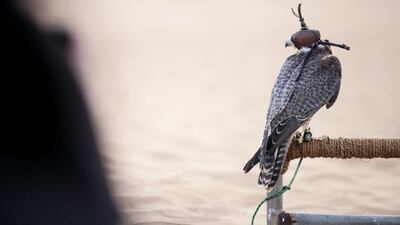Scientists in England are closing in on identifying the factor responsible for high performance in peregrine falcons – the 'Usain Bolt gene' – in the hope of breeding winners.
DURHAM, UK // It is embedded in Emirati heritage but the future of falconry could be shaped by a group of geneticists who have been collecting DNA samples of the most desirable birds of prey in their north of England laboratory.
In a process similar to racehorse breeding, scientists at Complement Genomics in Durham can now determine the gender of peregrine falcons immediately after hatching, how pure their bloodline is and their suitability for hunting and future athletic performance.
By determining the sex, breeders can identify what birds are more suitable to be reared by hand in the important first days of life. The data is gleaned from a simple Dh100 DNA test of egg shell membrane, and can provide a wealth of information for falconers and those working in the multimillion dirham Middle East market.
“We have a huge bank of DNA of many peregrine falcons,” said Dr Neil Sullivan, general manager of Complement Genomics, who made his name in human paternity testing.
“We want to see if we can use the power of genetics to identify the specific traits people are interested in. That could be colour or sporting performance.
“Females are more prized as they are easier to handle, so breeders want to know as early as possible what sex the eggs are. The females are the ones who are mainly used for sports.”
The sex of a falcon cannot be determined for weeks or even months after birth, so knowing the sex in advance would save trainers time in forming relationships with birds that turn out to be male.
The UAE is one of the biggest markets for falconry, attracting more than 600 new birds to the country annually.
Female captive-bred peregrines can fetch up to Dh335,000, whereas male birds sell for Dh85,000, on average.
Prized birds such as the gyrfalcon – the largest of the falcons used for sport – can fetch as much as US$1 million in the Middle East.
“I hesitate to use the phrase ‘designer falcons’ but that is essentially what we are doing,” said Dr Sullivan.
“We are still a long way from producing the perfect bird, but a lot of the genes in birds are the same as humans, and we recognise genes associated with human performance, so can identify why one bird is better than another. We are looking for the ‘Usain Bolt gene’ – it is a new field and very exciting.”
Genetic testing machines cost about Dh500,000 and the Durham lab has accumulated a large genetic repository of all the falcons to have gone through the programme. More than 1,300 eggs were tested last year.
Testing is also a boon for conservationists, as taking falcons from the wild is illegal.
Genetic information collected and stored at the lab can prove that a chick has been bred in captivity by identifying the parents.
David Stead, of Al Hurr Falconry Services in Dubai, has 19 falcons employed to scare growing numbers of crows and pigeons away from nesting in city buildings.
“The numbers of crows have exploded as Dubai has grown,” he said. “We fly falcons to create an uncomfortable environment for them.In their natural environments, falcons are specialist bird hunters.
“Pigeons and crows have a natural fear of them. They are terrified of their shape.
“People are surprised how small falcons are, but they are very efficient and effective at what they do.”
nwebster@thenational.ae


